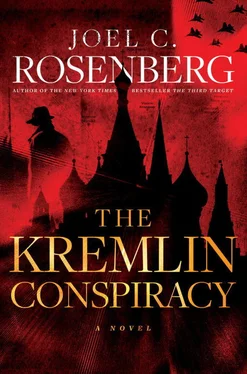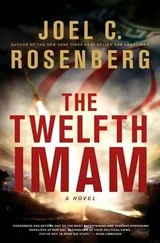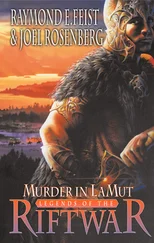Daskin gave the officer an appraising look. If he had served as an explosives expert in Russian Special Forces, he clearly knew what he was talking about.
“How would terrorists get their hands on something like that?” the chief inquired.
“I have no idea, but there was something else very odd—three sacks.”
“Right, what were those?” Daskin asked.
“Well, they sure weren’t filled with sugar, I can promise you that.”
“Then what?”
“We were stumped, so I told Misha here to bring me a portable gas analyzer.”
“And?”
“Hexogen. Military grade. This thing would have leveled this building and maybe several more. Hundreds would have died. A real bloodbath. We’re very lucky the sergeant major here found it in time.”
The men stood silently, contemplating the gravity of the disaster they had just averted.
Then Daskin turned to his boss. “Sir, with your permission, I think we should alert the FSB.”
10

Had the police chief simply followed Ilya Daskin’s advice, he might have lived.
Instead, the chief called Vasily Malenchenko, the reporter for Novaya Gazeta who was breaking one story after another about the bombings, for an exclusive over-the-phone interview. The chief told Malenchenko that he and his men had just foiled a major terrorist plot. In exacting detail, he explained how his men had discovered and defused an enormous bomb. He praised his officers, his bomb squad unit, and his detectives while also detailing just how much devastation would have been wrought given that the material was not the kind “normal” terrorists could get their hands on. No, he explained, meticulously describing the bomb itself, the detonator, the timer, the sticks of TNT, and the three mysterious sacks, this weapon was extra dangerous because it contained explosives produced specifically and exclusively for the Russian army.
Malenchenko immediately jumped in a taxi and raced to the news studios of NTV, one of Russia’s biggest television networks. Soon he was being interviewed on a live broadcast seen in all eleven of Russia’s time zones. He didn’t cite his sources, but he did relay everything he’d learned, including the part about the three sacks of explosives that “were produced specifically and exclusively for the Russian army” and effectively “impossible for Chechen terrorists to get.”
Malenchenko’s interview dominated the news cycle all day as the recording was rebroadcast over and over again. The impact on the nation was immediate and catastrophic. All the fears the average Russian felt about a Chechen attack killing them and their children in their sleep were ratcheted up a thousandfold by the notion that the terrorists had access to the most advanced nonnuclear explosives in the Russian military’s arsenal.
Oleg was up much of the night, chain-smoking, glued to the nonstop coverage, asking himself what everyone in Russia was asking: How in the world could Chechen terrorists have acquired military-grade bomb-making ingredients—not once but at least twice? Who inside the Russian army had given it to them? It couldn’t have been enlisted men. It had to be officers. High-ranking officers. But why would high-ranking Russian army officers agree to help kill women and children in such a barbaric manner? How many such traitors were there? How had they not been noticed? Where would they strike next? How soon could they be caught? And in the meantime, who in the military and in law enforcement could really be trusted?
These questions and hundreds of others quickly dominated the discussion in the media. Everyone had a theory, and each was more bizarre and scarier than the last.
At just after 4:30 in the morning, Oleg’s secure phone rang. It was Zakharov’s executive assistant. The chief of staff was ordering every member of the staff to get into the office immediately.
When Oleg arrived, the place was in crisis mode. The prime minister was coming by helicopter and would arrive at the Kremlin within the hour. Meanwhile, Zakharov was working the phones to manage the story, if not contain it. He had set himself up in the conference room. Generals, FSB officials, political aides, and public affairs officers were streaming in and out to provide updates and receive new directives, some of which were coming straight from the top. Initially, Oleg’s responsibility was to keep a written record of every fact, every instruction, every response and counterresponse. But soon the chief of staff directed Oleg to answer incoming calls from Duma members and mayors and political bosses. People were calling from all over the country, demanding answers, and it was up to Oleg to supply them.
Zakharov gave him the script.
First, Vasily Malenchenko was completely mistaken, Oleg was instructed to say. There had never been a real terror threat in Ryazan. What the local police had stumbled over was a training exercise, organized by the FSB to simulate a possible bomb threat. The whole thing was a giant misunderstanding. The bomb looked real, but it was merely a prop. No one had ever been in real danger.
Second, the three sacks of sugar did not contain military-grade explosives. They didn’t contain explosives at all, and certainly not hexogen. The sacks actually did contain sugar. Again, the whole scene was set up to look like a terror plot to test the instincts and reactions of local authorities and interagency cooperation with security officials in Moscow. But signals got crossed and a series of miscommunications had occurred.
Third, Malenchenko was a terrible journalist, a disgrace to the country, and should be fired immediately. If he was a loyal Russian and a good reporter, he would have done his job thoroughly and learned that this was simply a test. He could have cleared up the whole confusion rather quickly with just a few phone calls. Instead, Malenchenko had injected fear into a nation already rattled by the last several weeks of actual terror attacks by Chechen Islamists. He had gotten the story completely wrong, but now the citizens of Russia should carry on with daily life with the confidence that the military would crush the terrorists. The FSB was doing a first-rate job protecting the country. Furthermore, the simulation had, in fact, been highly successful. No one was killed. No one was injured. The cops on the beat in Ryazan performed well. So did the bomb squad and all the first responders. They all deserved medals. Malenchenko deserved Siberia.
Oleg dutifully delivered his message on dozens of calls as Zakharov and other members of his staff did the same. Oleg was relieved to learn the whole thing had been an FSB exercise, and he was honored and excited to be part of the rapid response team. That evening, he even got to be in the room as Prime Minister Luganov once again addressed the nation on live television. Luganov denounced Malenchenko by name while praising the police and first responders of Ryazan. He encouraged the nation not to worry and provided an update on how many Chechen terrorists had been killed and how proud he was of the resolve of the Russian people in the face of such “savagery and barbarism.”
National public opinion polls moved quickly and dramatically. By the end of that fateful week, Luganov’s approval rating had shot up from a mere 4 percent to 21 percent. Images of Russian bombers devastating Chechnya filled the evening news. Two weeks later, Chechen rebel leader Ramzan Zakayev was killed by a Russian sniper, and Luganov’s approval ratings doubled to 45 percent. By the time the presidential elections were held later that fall, Luganov won in a landslide, capturing more than 63 percent of the vote.
Читать дальше













